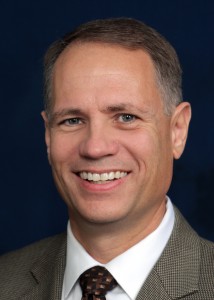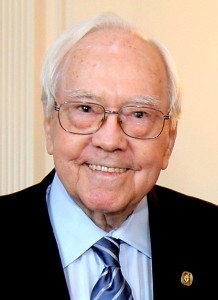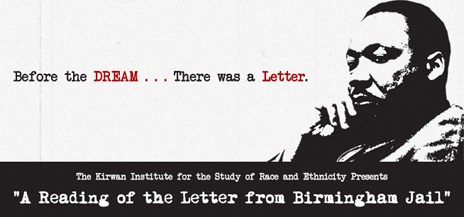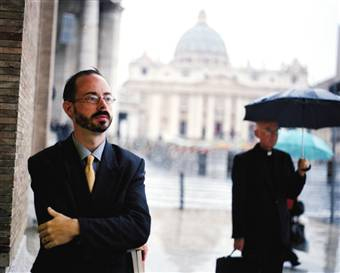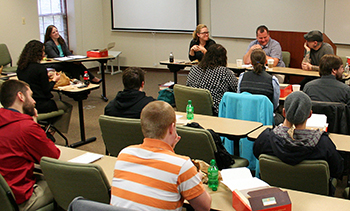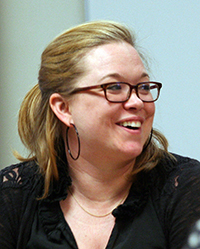In honor of St. Joseph's Day March 19, Rev. Julia Nielsen (M.Div. '09), executive director of the Greater Hilltop Area Shalom Zone, delivered the following sermon in MTSO's midweek chapel service. Her text was Matthew 1:18-25.
There's a years-long running joke in my group of clergy friends. Whenever we get together for drinks or dinner and the ministry stories start swirling, inevitably one of us will blurt out, "Add that to the 'Things They Don't Teach in Seminary 101' syllabus!"
At this point, that class is going to have to have 30 credits.
I'll tell you, I had a life-forming and faith-strengthening education here at MTSO. With the exception of the sheer terror I felt during the first session of my first semester's Intro to Theology class with Dr. Mercadante, I loved every minute of my four years here. But I have to tell you, there's a lot that seminary can't teach because it can't predict the future, or all of human behavior. There are surprises out there. They can tell you that God is going to mess with your normal, that God does things like that. But what it will look like in practice can never be taught.
Even with years under our belts of studying the work and will of God, we still can't predict what God will do. That's the thing about this "new thing" pattern God has stuck to – new means unpredictable. New means scary. New means hard to study for. Sometimes, ministry feels like a Choose Your Own Adventure book, but sometimes it seems like someone else is choosing the adventure and you're just watching the pages flip. All you can do is remain present.
In honor of this kind of ministry, I'm grateful that today is St. Joseph's Day – Joseph, patron of the universal Church, fathers, carpenters and social justice – and I'm going to don a miter here for a moment and add to the earthly father of Jesus' designations the Saint of This Isn't Normal.
I love this story in Matthew. It's a good birth narrative: some good and juicy details but not so many (thank you, Luke) that you start to close your eyes. We get lots about Joseph here, and not much about him anywhere else. What are we to do with Joseph, silent throughout the gospel story, largely missing except in Matthew, a role player cast in a part already taken?
We read what we have carefully. And any fair reading of this part of the gospels concludes that Matthew's birth narrative is really Joseph's story. It is Joseph's dreams that propel the narrative, Joseph's faithful response in accepting Mary that creates the holy family, Joseph's decisive action that saves the child from the slaughter of the innocents.
Matthew tells us he was a righteous man and then proceeds to show us exactly that in the rest of the story. Like I said, we don't know a lot about this man, but we can learn quite a bit from what we do know. He was not a sophisticated man. He was the kind of man who could take a pregnant, teenaged wife and a troublesome, temperamental and precocious boy and make a life with them.
He is a visionary who trusts his dreams, a righteous man, a man of action and a man of virtue. A righteous man wants to the right thing, not the legal thing. He has conviction and trust. He is a Saint of the Perfectly Non-Judgmental. Saint of the Accepting. Saint of This Isn't Normal.
Frankly, on the days when I struggle to understand or identify with Jesus in any way, when I swear I just don't know why I didn't get taught this thing in seminary (or Sunday school, for that matter), it's Joseph I have to remember to look to.
Here he is, minding his business, not looking for any trouble – maybe just a good life, a wife he can spend enjoyable evenings with, better business some days, good health – and suddenly, out of nowhere, there's this wrench in his expectations. At first, he thinks he's got it handled: He's been taught how to handle the problem of a girl who steps out. The Law is pretty clear. He resolves to follow the rules. He is righteous, after all.
But then, his normal gets all weirded up. There's an angel. And some pretty intense news about the baby being Spirit born, and prophesies about his future son's power to save people from sin.
Sudden left turn. And this simple man pivots without – according to the text – even a hesitation. He determines to step one foot out at a time and be a really, really good listener. He has to get this right. There are lives on the line, and frankly, I don't think anyone probably taught Joseph much about how to deal with this situation. He's in new and uncharted territory.
My own territory is on the West Side of Columbus. I serve as a deacon in the United Methodist Church, and my setting is a typical urban core cityscape. I run a community development nonprofit there called the Shalom Zone and a little church that partners with the Zone to transform our community from the urban wasteland it has been to the beautiful city on the Hilltop we're called to be. But there's wreckage in that landscape. Brokeness: 36 percent poverty; 44 percent graduation rates. Soul-killing use of drugs and alcohol, and deeply entrenched racial conflict.
There's also incredible family support and joy at the gifts of daily living and opportunities for deep gratitude. It's the devastating and the gorgeous jumbled up in a heap.
But: No one ever told me I would find myself regularly requested to do exorcisms after seminary because the angry spirits of abusive boyfriends won't leave the house. No one ever told me I would preach with a 6-year-old on my hip one Sunday after she had a total meltdown in the fellowship hall because that was the only way she wouldn't hurt herself or someone else with her teeth.
No one ever taught me the right way to manage race relations between Somali immigrant mothers and African-American grandmothers during a community lunch. No one ever told me how exactly one is supposed to empower tired parents to change a broken city school system while politicians fight over testing policies and zero-tolerance.
No one certainly ever taught me the right way to respond after seeing a parishioner's penis during a hospital visit. No one ever taught me what to say during church when the first child I ever baptized had hanged himself in his closet the Friday night prior.
Because this isn't my normal. God put this calling in my life. I was on my way somewhere else, to a nice and comfortable life elsewhere with other people. But now I look gratefully and constantly to the Saint of the Perfectly Non-Judgmental, the Saint of the Perfectly Present, the Saint of the Nobody Taught Me How to Do This, Saint Joseph. Because Jesus sort of messed with my life, and sometimes I can't bring myself to look him right in the eye.
The troubling and perfect truth of the matter is, Jesus messed up Joseph and Mary's lives, too. I don't think I'm going out on a limb here by saying, looking at the whole span of his 30 years from incarnation to resurrection, they suffered more because he lived than they would have if that angel hadn't made an appearance to Mary in the first place.
Joseph's life, especially, was harder. Better. And harder.
When that left turn, that call and change come, how do we work with that? With what we have? Or when you think you're called to do one thing, and it's something entirely different? Jesus knew how to do this, how to listen and follow and trust and be convicted in the face of impossible calling.
Where did Jesus learn this from? He learned it from his dad. He learned it from his dad.
This Ministry of Presence I'm talking about, it really sucks, to be honest. Now, they can't kick me out of the church or out of this chapel for saying that, because I'll just say it's a theological term we use on the Hilltop all the time, so I'm going to say it again. It really sucks. The ongoing, long-term chaos and mess of it all. I don't know why any of us wants to do it.
Perhaps we shouldn't want to. Perhaps those of us who seek after it so desperately need to reevaluate. I learned in Church History once that becoming a bishop in the early church was so terrible and dangerous there were some folks who ran, and who got clubbed over the head and consecrated while unconscious. Otherwise, no one would do it. Sounds about right.
Perhaps we ought to run. But I look at Joseph, and his Ministry of Presence, and accepting the Not Normal, the Ministry of Making the Left Turn Look Good, and I think, well, God seems to work in these new things. Seems to make them and then ask us to trust. To remain righteous.
Conviction and trust. Trust in God, and in dreams. God speaks in visions and dreams and fiery furnaces, in hopes and convictions and impossible burning bushes. God speaks. Are we listening?
If we expected to be taught everything in seminary, what room have we left for God's speaking in the surprising moments of ministry? What trust are we exhibiting? Where is our assurance of grace, our satisfaction in obedience? When will we trust that God made a man who is the Saint of This is Not My Normal? To ignore the Torah, to ignore the custom of our time, like Joseph, to take God's spirit at its word and respond in faith no matter the craziness of the request, or the way it will mess up our lives.
Joseph was a righteous man. Biblically this means he was clear in his relationship to God and acted out of that clarity. Traditionally it means he was willing to do something few others would be willing to do, and is rightly honored. Theologically he managed to bridge somehow his heritage and his setting so that he could raise up God with Us, the bridge of heaven and earth.
What did I learn in seminary? To look to the saints, to look to Jesus, to look into the gently swirling chaos and have faith that if I take the next right step, the one following may go left, but my foot will not stumble if it's in trust that I take it.
And so, my friends, I heap a blessing of not normal upon you. May the joy of the God of St. Joseph keep you safe on this journey, surprise you eternally along the way,and make the adventure so filled with opportunities for faith that you reach the other side called Righteous, a child of Jesus, adopted grandchild of Joseph.
Amen.
